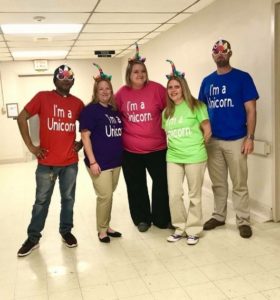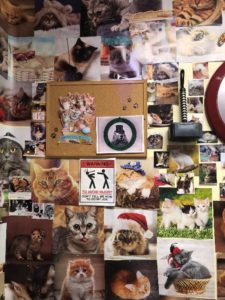As a current intern who has now completed my third month of my internship year, I was reflecting on the days/weeks/months in which I felt I was starting to feel more confident and comfortable as my position as an intern. When I first started, there was a period of time in which I felt the ‘imposter syndrome’. I also thought of how my self-care techniques had decreased some since I started my internship and how that might have affected my overall wellbeing.
There was an exploratory study completed that looked at 363 interns and their use and frequency of self-care techniques that they implemented during the year on internship. These are important aspects to consider when looking at the stressors during internship year and students going from possibly becoming concerned with performance evaluations or adjusting to a full-time schedule of clinical work. The author of this article identified common self-care techniques such as having a hobby, taking a vacation, exercising, reading for pleasure, praying, and supervising peers. The authors also identified various factors that have the potential to prevent an individual from engaging in self care such as relationships with their family and partners, self-awareness, balance in their personal and professional lives, and the personal values that an individual may have. The current study looked at the types of self-care activities that the current interns might have engaged in and the effectiveness of the activities.
The current study included 363 total interns, who were mainly at hospitals, university counseling centers, or VA centers. The current authors created their own Intern Self-Care Scale (ISCS) in order to assess the effectiveness and frequency of self-care activities. The authors found that of the items that were in the survey, 60% of the items were used ‘frequently’, 37% were used ‘sometimes’, and 3% were used ‘rarely’. The authors found the effectiveness of the self-care activities were 77% ‘frequently effective’ and 23% were ‘sometimes effective’. The authors of this study wanted to start the dialogue of looking at intern self-care and possibly future studies could looking at the relationship between self-care strategies and stress.
One of the main takeaways from this article was looking at self-care activities in a long-term direction instead of the short term of internship. When young psychologist are starting off their careers, it can be important to look at their strategies for taking care of themselves, but also making sure that they are able to get their work on and helping them using those self-care strategies long-term and carry them into their careers. This can be difficult because as students we can be taught that getting the work done is the most important aspect and putting our self-care techniques to the side and not paying as much attention to them. This article focuses on prospective and current interns and how they should consider the self-care techniques when looking at potential sites. As potential interns are beginning the process of interviewing for intern sites, look at your current self-care techniques and how much you are implementing them and consider having that as a question that you ask potential supervisors and current interns on the views of self-care. Also, make sure that as an interviewee that you are taking care of yourself
throughout the interviewing process and starting implement those self-care techniques now before you go on internship.
Hannah Sutherland, MA, LPA (Temp)
WKPIC Doctoral Intern

 In my first Friday Factoid of the month, I mentioned that it is important to create friendships over the course of your internship. I have learned it is not only important to have friendships within your cohort, but with other staff members at work who are not related to your department. I have been lucky enough to have developed friendships with several individuals who understand my quirky nature and who are not afraid of having fun at work.
In my first Friday Factoid of the month, I mentioned that it is important to create friendships over the course of your internship. I have learned it is not only important to have friendships within your cohort, but with other staff members at work who are not related to your department. I have been lucky enough to have developed friendships with several individuals who understand my quirky nature and who are not afraid of having fun at work. By far the best shenanigan of the year not only started a department prank war, but WON the prank war. It is said that on a Sunday afternoon two awesome, dedicated, and creative people entered the office of Will Battle. Rumor has it that in 4 hours over 1200 cat pictures were hung across the entire office floor to ceiling with approximately 6 rolls of tape. Pictures of this office do not do it justice so if you are ever at the hospital make sure to ask if you can see the “Cat Office.”
By far the best shenanigan of the year not only started a department prank war, but WON the prank war. It is said that on a Sunday afternoon two awesome, dedicated, and creative people entered the office of Will Battle. Rumor has it that in 4 hours over 1200 cat pictures were hung across the entire office floor to ceiling with approximately 6 rolls of tape. Pictures of this office do not do it justice so if you are ever at the hospital make sure to ask if you can see the “Cat Office.” 